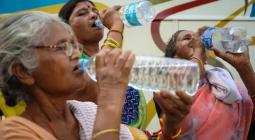‘Essential to act now’ to prevent chaotic climate breakdown, warns UN chief
On the eve of Cop29 in Baku, António Guterres says dangers are underestimated as irreversible tipping points near
The world is still underestimating the risk of catastrophic climate breakdown and ecosystem collapse, the UN secretary general has warned in the run-up to Cop29, acknowledging that the rise in global heating is on course to soar past 1.5C (2.7F) over pre-industrial levels in the coming years.
Humanity is approaching potentially irreversible tipping points such as the collapse of the Amazon rainforest and the Greenland ice sheet as global temperatures rise, António Guterres has said, warning that governments are not making the deep cuts to greenhouse gas emissions needed to limit warming to safe levels.
Speaking to the Guardian, the UN secretary general said that a second US departure from the Paris climate agreement under a new Donald Trump presidency would risk crippling the process but said the accord would survive.
With wildfires, drought and extreme weather already ravaging parts of the planet, new research raises concerns about the stability of natural carbon sinks that underpin decarbonisation efforts. Forests, plants and soil – as a net category – absorbed almost no carbon in 2023 during the hottest year on record. While the collapse of land carbon sinks may be temporary, scientists have warned that cracks in the resilience of the Earth’s systems are beginning to show.
Guterres urged greater coordination on the interlinked environmental crises of the 21st century, warning that it was impossible to take action on global heating without action on biodiversity loss to protects forests and other natural carbon stores and sinks.
“The risk of these tipping points accelerating climate change is something that must be taken very seriously. Just to give two examples, some people say that we might come to a situation where the Amazon forest will become a savanna irreversibly, or that the Greenland [ice sheet] and west Antarctica will melt.
“Even if it happens over a huge period, it will melt irreversibly. So we are coming close to dramatic gamechangers in relation to the impacts of climate change in the life of the planet,” Guterres said in an interview on the sidelines of the biodiversity Cop16 in Cali, Colombia, which concluded on 1 November.
“The world is still underestimating climate risks. I have no doubt that we are risking reach[ing] a number of tipping points that will dramatically accelerate the impacts of climate change. It is absolutely essential to act now. It’s absolutely essential to reduce emissions drastically now,” he said.
For the next two weeks, governments will gather by the Caspian Sea in Baku, Azerbaijan, to discuss how to increase financing for climate adaptation and mitigation. Tense talks are expected over a new financial target to replace the $100bn (£77.5bn) commitment that expires next year.
Negotiators will debate which countries will help provide the trillions of dollars needed to decarbonise the world economy, with pressure to contribute on petrostates such as the United Arab Emirates (UAE) and Saudi Arabia. Many states in the global north believe that China should no longer be classified as a developing country in the UN climate process due to its economic power and should also be expected to contribute to funding.
Guterres would not comment on how he thought the donor base to the climate process should change, instead urging governments to take decisive action on phasing out fossil fuels entirely.
“Until 2030, we should be reducing by 9% every year. Unfortunately, last year, there was still a growth of 1.3% which means that either we fully assume the sense of urgency at the level of governments, corporations and the other key generators of climate change, or we risk not only to go above the 1.5 degrees, but eventually to go above two degrees. Let’s not forget that we are on course for 3.1C at the present moment,” he said.
This year, a Guardian survey of hundreds of the world’s leading climate scientists found that most of them expect global heating to exceed 1.5C, reaching at least 2.5C above pre-industrial levels this century and prompting warnings of large-scale societal destruction.
Guterres said that he thought limiting global warming to 1.5C was still possible but acknowledged that the world would overshoot in the coming years.
“I believe [1.5C] is still possible. I believe there will be overshoots, but I hope that there will be the conscience to act swiftly in order for those overshoots to be short-lived. Technological evolution, what happens with renewable energy … and other innovations demonstrate that if there is political will, the 1.5 degrees is reachable.
“So the question is not whether the 1.5 degrees is possible or not. The question is whether there will be – or not – political will for that. Let’s be honest, until now, that political will has not been there. So either the political will emerges in order to make it possible, or it will be lost,” he said.
When asked whether the US leaving the Paris agreement for a second time would be fatal, Guterres said it would survive but warned that it could leave the process “crippled”.
“The Paris agreement can survive, but people sometimes can lose important organs or lose the legs and survive. But we don’t want a crippled Paris agreement – we want a real Paris agreement,” the UN secretary general said. “It’s very important that the United States remain in the Paris agreement.”
Guterres said in June that fossil fuel companies should be banned from advertising, calling them the “godfathers of climate chaos”. When asked if he thought they should be excluded from climate Cop summits, he said there should be greater focus instead on governments that did not stand up to pressure from the industry.
“What worries me is not that there are people lobbying for fossil fuels; what worries me is that governments might not resist that lobby. Let me be very clear, there is no way to preserve 1.5 degrees or avoid a catastrophic development in relation to climate change if we don’t accept the principle that there must be a phase-out of fossil fuels,” he said.
“Until now, there has been some ambiguity sometimes in the texts and the problem with ambiguity is that those who misbehave will have a justification to do so.”
Questioned on whether Saudi Arabia, the UAE and China should contribute to climate finance, Guterres said the countries were in different positions.
“You cannot compare Saudi Arabia with China. The GDP per capita in Saudi Arabia is much higher, and Saudi Arabia basically has built its wealth on oil and gas,” he said.
“I don’t think we need to go on with the exploitation of new sources, because I’m totally convinced that we will not be able to use the reserve that exists in the world until the end of history,” he said.
Cover photo: Icebergs from the Sermeq Kujalleq glacier in the Ilulissat Icefjord in western Greenland. Since 2002 the glacier has retreated by nearly 14 miles. Photograph: Sean Gallup/Getty Images



